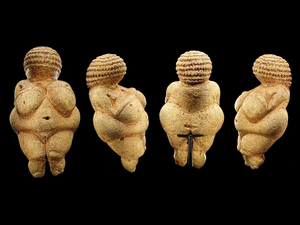Venus of Willendorf
Artist: Unknown
Year: 2018
Date of Action: March 2018
Region: Europe
Location: Online
Subject: Nudity
Medium: Electronic Media, Sculpture
Confronting Bodies: Facebook
Description of Artwork: The Venus of Willendorf is a 30,000 year old masterpiece of the Paleolithic Period. Its voluptuous form, carved in stone, portrays a naked woman. It is an iconic statuette and the most well-known prehistoric depiction of a woman in the world.
Art critic Camille Paglia writes: "Venus of Willendorf carries her cave with her. She is blind, masked. Her ropes of corn-row hair look forward to the invention agriculture. She has a furrowed brow. Her facelessness is the impersonality of primitive sex and religion. There is no psychology or identity yet, because there is no society, no cohesion. Men cower and scatter at the blast of the elements. Venus of Willendorf is eyeless because nature can be seen but not known. She is remote even as she kills and creates. The statuette, so overflowing and protuberant, is ritually invisible. She stifles the eye. She is the cloud of archaic night."
The Incident: In December 2017, Laura Ghianda, an Italian arts activist, posted a picture of the artwork on Facebook. It went viral before Facebook censored the post and took the image down. Ghianda found this action unacceptable, writing that the "war on human culture and modern intellectualism will not be tolerated."
The Natural History Museum (NHM) in Vienna, which displays the figurine in its museum as a part of its collection, expressed outrage over the incident. "An archaeological object, especially such an iconic one, should not be banned from Facebook because of 'nudity,' as no artwork should be," the Vienna museum stated in a press release.
In response to the fiasco, Vienna’s tourism board created an OnlyFans account in protest against traditional social media platforms, whose censorship of its art museums and galleries included removing posts of the Venus of Willendorf alongside other works like Liebespaar by Koloman Moser.
The “Vienna strips on OnlyFans” advertising campaign was not only meant to encourage tourists to visit, but also to raise awareness of the censorious standards which contemporary artists are subject to on traditional social media platforms.
Results of Incident: Facebook's apology came in reaction to the Viennese museum's statement, the Viennese tourism board's OnlyFans campaign, and the ensuing public outrage. The company's spokesperson explained that Facebook's policies do not allow depictions of nudity or even suggested nudity. "However, we make an exception for statues, which is why the post should have been approved," they admitted.
Source:
• https://www.dw.com/en/facebook-apologizes-for-censoring-prehistoric-figurine-venus-of-willendorf/a-42780200,
• https://hyperallergic.com/429553/facebook-censors-venus-of-willendorf/,
• https://www.designboom.com/art/facebook-censors-venus-of-willendorf-03-01-2018/,
• https://www.theartnewspaper.com/2018/02/27/facebook-censors-30000-year-old-venus-of-willendorf-as-pornographic,
• https://www.goodreads.com/quotes/757840-venus-of-willendorf-carries-her-cave-with-her-she-is,
• https://www.architecturaldigest.com/story/vienna-museums-turn-to-onlyfans-to-avoid-censorship,
• https://www.theguardian.com/artanddesign/2021/oct/16/vienna-museums-open-adult-only-onlyfans-account-to-display-nudes,
• https://www.washingtonpost.com/nation/2021/10/20/vienna-museums-artwork-social-media-onlyfans/,
• https://www.artnews.com/art-news/news/onlyfans-vienna-museums-1234607398/
